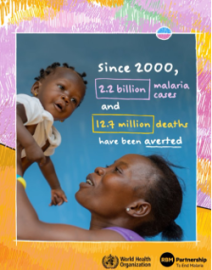
The World Health Organisation (WHO) says revitalised efforts are urgently needed in the battle against malaria.
Today marks World Malaria Day, which is observed globally every year on 25 April to acknowledge the collective efforts to control malaria.
In a statement released on Friday, WHO highlighted the importance of global collaboration, which has saved nearly 13 million lives since the year 2000.
Despite the progress, the agency said it has certified 45 countries and one territory as malaria-free, while many countries with a low malaria burden continue to move steadily towards the goal of elimination.
Of the remaining 83 malaria-endemic countries, 25 reported fewer than 10 cases of the disease in 2023.
WHO has warned that the fight against the disease is far from over, with nearly 600 000 lives lost to malaria in 2023, with African nations bearing the brunt of the burden.
WHO’s Director-General, Dr Tedros Adhanom Ghebreyesus, has stressed the fragility of current gains.
“The history of malaria teaches us a harsh lesson that when we divert our attention, the disease resurges, taking its greatest toll on the most vulnerable.
“But the same history also shows us what’s possible, that with strong political commitment, sustained investment, multisectoral action and community engagement, malaria can be defeated,” said Ghebreyesus.
In a promising development, 20 African countries, including Mali, are set to introduce malaria vaccines to protect children from the disease.
In addition, WHO said the use of advanced insecticide-treated nets is on the rise, significantly contributing to malaria prevention.
The theme for this year’s campaign is: “Malaria ends with us: Reinvest, reimagine, reignite”.
WHO urges governments, health organisations and communities to come together in a renewed commitment to eradicate malaria once and for all.
Ghebreyesus has called for sustained commitment and investment at all levels, urging countries to enhance domestic healthcare spending. – SAnews.gov.za


